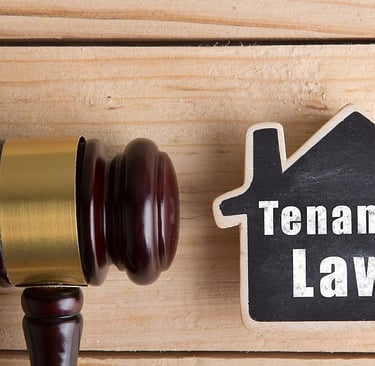A Guide to Rental Laws in Dubai: Know Your Rights as a Tenant and Landlord


Dubai’s property market has experienced significant growth over the years, attracting both local and international investors and residents. With its booming rental market, it is crucial for tenants and landlords to understand their rights and obligations under Dubai’s rental laws, which are governed primarily by Law No. 26 of 2007 (as amended by Law No. 33 of 2008). This blog aims to provide an overview of the key aspects of Dubai’s rental laws and what you need to know as a tenant or landlord.
1. The Role of the Dubai Rental Dispute Center (RDC)
The Dubai Rental Dispute Center (RDC) is the legal body established to handle rental disputes in the emirate. Both tenants and landlords can file cases with the RDC if there are conflicts regarding the lease agreement, payment issues, or eviction matters. The RDC offers mediation and legal proceedings to resolve disputes in a timely and efficient manner.
2. Rental Contracts and the Ejari System
Under Dubai’s rental laws, all tenancy contracts must be registered with Ejari, an online system that standardizes lease agreements and ensures legal protection for both parties. The Ejari registration is mandatory, and it provides official documentation that can be used in the event of a dispute.
Key points to note:
The contract must clearly state the rental amount, duration, and any conditions agreed upon.
Tenancy contracts typically have a fixed term of one year but can be renewed.
Both parties must honor the terms stated in the Ejari - registered contract.
3. Rent Increases and the Rent Cap Law
One of the most frequently asked questions is how much a landlord can increase the rent upon renewal. This is regulated by Decree No. 43 of 2013, which sets limits on how much rent can be increased based on the current market rental rates.
If the rent is less than 10% below the market rate, no increase is allowed.
If the rent is between 11% to 20% below the market rate, the landlord can increase by up to 5%.
If the rent is 21% to 30% below the market rate, the increase can be 10%.
The maximum allowable increase is 20% if the rent is 40% or more below the market rate.
The Dubai Real Estate Regulatory Agency (RERA) provides an online rental index that helps tenants and landlords determine the legal limits for rent increases.
4. Security Deposit and Maintenance
Landlords can require a security deposit, typically amounting to 5% of the annual rent for unfurnished units and 10% for furnished units. This deposit is held to cover any potential damage or unpaid bills at the end of the tenancy. It is refundable if the property is returned in good condition, subject to deductions for repairs or damages caused by the tenant beyond normal wear and tear.
Maintenance responsibilities are generally shared between the landlord and tenant:
Landlord’s responsibility: Major repairs, structural issues, and maintenance of essential services like plumbing and air conditioning.
Tenant’s responsibility: Routine upkeep and minor repairs, unless otherwise specified in the contract.
5. Eviction Rules and Tenant Protection
The rights of tenants are protected under Law No. 33 of 2008, which sets out the conditions under which a landlord can evict a tenant. The following are the legal grounds for eviction:
Non-payment of rent: The landlord can evict the tenant if rent is not paid within 30 days of receiving a formal notice.
Violation of lease terms: Tenants who violate the lease terms or use the property for illegal activities can face eviction.
End of tenancy for personal use or sale: Landlords can evict tenants if they intend to sell the property or use it for their own family residence, provided they give the tenant 12 months' written notice by registered mail or notary public.
Major renovation or demolition: Eviction is allowed if the property requires extensive renovation or demolition, also with 12 months’ notice.
It is important to note that a landlord cannot evict a tenant without proper legal notice, and tenants can challenge an eviction if they feel it is unjustified.
6. Early Termination of the Lease
Early termination of a tenancy agreement is not automatically allowed under Dubai law unless it is mutually agreed upon by both the tenant and landlord. Tenants wishing to leave the property early should refer to their contract to check for early termination clauses and negotiate any penalties or settlements with the landlord. Failing this, tenants may be liable for paying the rent for the remainder of the lease term.
7. Rental Disputes: How to Resolve Them
In the event of a disagreement between a landlord and tenant, such as a dispute over rent increases, eviction notices, or unpaid bills, the matter can be taken to the RDC. The dispute resolution process includes filing a case by either party at the RDC, which will review the evidence and look into the dispute, notify the other party, schedule a hearing or more, and eventually pass a binding ruling to both parties which failure to abide by it shall have further legal ramifications.
It is important for both tenants and landlords to be aware of the legal processes to protect their rights during rental disputes.
Conclusion
Understanding Dubai’s rental laws is essential for both tenants and landlords to ensure their rights are protected and to avoid potential disputes. Registering contracts with Ejari, following RERA’s rental index, and knowing the legal grounds for eviction and rent increases will help both parties navigate the rental process smoothly.
For any rental-related legal advice or representation in disputes, it’s advisable to consult a professional law firm to guide you through the regulations and protect your interests.


